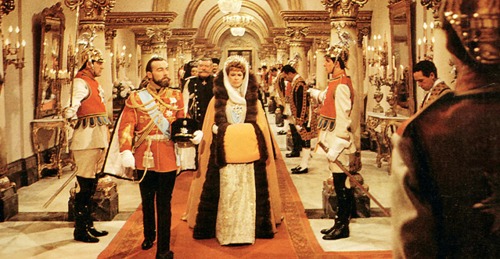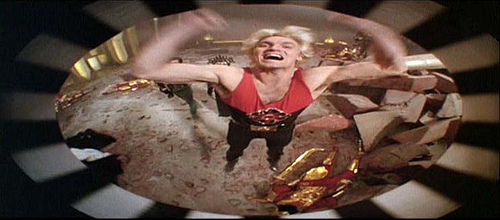
(Depending on how much you know about world history, the review below may contain spoilers.)
It was nearly four years ago that I decided that my goal in life was to watch and review every single film — no matter how obscure or potentially disappointing — that had ever been nominated for best picture. Of course, that’s not my only goal. If anything, I may have too many, often contradictory goals in my life. But seeing all of the best picture nominees was definitely one of them and, all these years later, it’s a goal that I’m still trying to achieve. With the help of TCM and their nonstop schedule of movies made long before I was born, it’s also a goal on which I am slowly but surely making progress.
Last night, as I scrolled through the guide, I noticed that TCM would be showing Nicholas and Alexandra, a three and a half hour film from 1971. Now normally, I would be hesitant about watching a film that long, if just because I have ADHD and I doubt I’d be able to concentrate on it. In a theater, watching the action unfold on a big screen, it wouldn’t be a big deal. However, it’s totally different when you’re talking watching a movie on TV in a house that is full of potential distractions. Add to that, Wednesday night is when I usually watch shows like Survivor, Hell’s Kitchen, and South Park.
But, here’s the thing. The title Nicholas and Alexandra sounded familiar to me and not just because I’m an obsessive history nerd. I did some checking and I discovered that, regardless of how obscure the film may be today, Nicholas and Alexandra was nominated for best picture. It lost to The French Connection but it was nominated.
So, of course, I had to watch it.
And you know what?

It’s not a terrible movie. It’s certainly not great. It has multiple flaws and it’s hard to imagine this film being nominated alongside films like The French Connection, Last Picture Show, and A Clockwork Orange. Watching the movie, I got the feeling it was probably nominated because it was a big, expensive epic and not because it was one of the best of the year. But, if you stick with the film (which, if we’re going to be honest here, is much easier said than done), it’s not quite as disappointing as you might expect it to be.
Nicholas and Alexandra tells the story of the last monarch of Russia, Tsar Nicholas II (Michael Jayston). Struggling to escape the shadow of his father and incapable of understanding what life is like for those not born into royalty, Nicholas is portrayed as being well-meaning but autocratic and blind to the fact that the days of royalty are rapidly coming to an end. His wife, Alexandra (Janet Susman) is also unpopular with both the Russian citizenry and the royal court on account of being German.
Alexandra spends most her time doting on her youngest son, Alexei, who suffers from hemophilia. When a flamboyant Serbian monk named Rasputin (Tom Baker) claims that he has the power to heal Alexei, Alexandra immediately brings him into the court. Soon, rumors are flying across Russia about Rasputin’s relationship with Alexandra.
Meanwhile, men with names like Lenin (Michael Bryant), Trotsky (Brian Cox), and Stalin (James Hazeldine) are plotting to lead a “worker’s revolution…”
If you know anything about history, it’s not really a spoiler to reveal what happens in the second half of Nicholas and Alexandra. (And if you’re not into history, you probably would not have any interest in watching the movie in the first place.) Archduke Franz Ferdinand is assassinated, plunging the entire world into war. Russia declares war on Germany and the German-born Alexandra becomes even more unpopular than before. The rest of the royal court, jealous over the mad monk’s influence, plots against Rasputin. The Tsar is forced from the throne and Nicholas and his family spend their last days as captives of the people they once ruled. Now a powerless prisoner, Nicholas finally starts to understand the world beyond his palace walls. However, in the end, Nicholas, Alexandra, their children, and their loyal servants are taken into a small room and violently executed. End of movie.

So, there are a lot of things wrong with Nicholas and Alexandra. Not the least of the film’s problem is an unwieldy length and generally slow pace. (The film was directed by Franklin J. Schaffner, who also directed the still-fun original Planet of the Apes. Little of the flair he brought to Planet of the Apes is present here.) This is one of those films that is full of incident with various characters popping up and discussing the intricacies of international politics with little concern as to whether or not any of this is the least bit cinematic or even compelling on a narrative level. The film has a huge cast but very few memorable characters.
Even worse is that neither Nicholas nor Alexandra never come across as being all that interesting. The film makes the case that Nicholas’s downfall was largely a result of him being unlucky enough to rule at a time when people across Europe and Asia were rejecting the old ways for the new ways of revolution and industrialization. Nicholas is continually portrayed as being well-meaning but isolated and that has the potential to be interesting but, at times, the film feels almost as emotionally detached as its characters.
That said, Nicholas and Alexandra does work as a spectacle, as a showcase for beautiful clothing and ornate scenery. As a character study, Nicholas and Alexandra largely fails but, as a fashion show, it’s actually a lot of fun. Early on in the film, there’s a lengthy sequence in which Nicholas and Alexandra walk down the red-carpeted hallways of their palace. It’s shot through Nicholas’s eyes and we see a collection of guards and noblemen and women standing to the side and bowing their heads as the Tsar and his wife walk past. It’s a good scene and one that perfectly shows not only the life that Nicholas is used to but also why Nicholas doesn’t want to change that life.

Perhaps not surprisingly, the first two hours of Nicholas and Alexandra work best when they focus on the flamboyant character of Rasputin. Baker does a really go job as Rasputin, delivering all of his lines with a ferocious intensity while staring with obviously unhinged eyes. When he’s with Alexandra, Rasputin is calculating and coldly conniving, providing just enough comfort to keep her under his control. When he’s with Nicholas or any of the other male members of the court, he reveals himself to be an arrogant libertine, making profane jokes and bragging about his conquests. It’s a really good performance but, as with so many other good performances in this film, it occasionally gets lost in the film’s dense production.
The best moments of Nicholas and Alexandra come towards the end, with the humbled Nicholas finally revealing his humanity and the Tsar’s family struggling to maintain their dignity even as their inevitable fate approaches. At this point, the performers came to life. The film suddenly had an emotional resonance. It finally became about something! For those final 20 or so minutes, Nicholas and Alexandra suddenly seemed worthy of being awarded.
In fact, based on those final 20 minutes, I would even be willing to see a sequel called Nicholas and Alexandra and Rasputin Makes Three.
(Though I’m not sure how that sequel could ever be made. As @Kev1Media pointed out when I suggested it on twitter, Adam Sandler would have to be somehow involved.)
As for Nicholas and Alexandra, it’s not a great film but if you’re into history or you’re an Oscar completist like me, the film has its occasional charms. You just have to be willing to look for them.

 Life on the planet Mongo is not easy. Aided by Darth Vader wannabe Klytus (Peter Wyngarde) and the sadistic General Kala (Mariangela Melato), the evil Emperor Ming (Max Von Sydow) rules with an iron fist. All of the citizens are heavily taxed and kept in a state of perpetual war in order to keep them from joining together and rebelling. Those who attempt to defy Ming are executed.
Life on the planet Mongo is not easy. Aided by Darth Vader wannabe Klytus (Peter Wyngarde) and the sadistic General Kala (Mariangela Melato), the evil Emperor Ming (Max Von Sydow) rules with an iron fist. All of the citizens are heavily taxed and kept in a state of perpetual war in order to keep them from joining together and rebelling. Those who attempt to defy Ming are executed.




